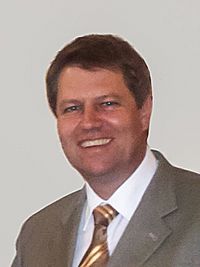Klaus Iohannis facts for kids
Quick facts for kids
Klaus Iohannis
|
|
|---|---|
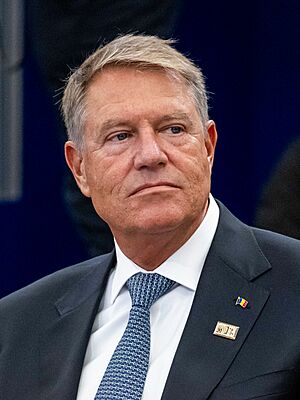
Iohannis in 2024
|
|
| 6th President of Romania 5th President of the Republic of Romania |
|
| In office 21 December 2014 – 12 February 2025 |
|
| Prime Minister |
See list
Victor Ponta
Gabriel Oprea (acting) Sorin Cîmpeanu (acting) Dacian Cioloș Sorin Grindeanu Mihai Tudose Mihai Fifor (acting) Viorica Dăncilă Ludovic Orban Nicolae Ciucă (acting) Florin Cîțu Nicolae Ciucă Cătălin Predoiu (acting) Marcel Ciolacu |
| Preceded by | Traian Băsescu |
| Succeeded by | Ilie Bolojan (acting) Nicușor Dan |
| Mayor of Sibiu | |
| In office 30 June 2000 – 2 December 2014 |
|
| Preceded by | Dan Condurat |
| Succeeded by | Astrid Fodor |
| Leader of the National Liberal Party | |
| In office 28 June 2014 – 18 December 2014 |
|
| Preceded by | Crin Antonescu |
| Succeeded by | Alina Gorghiu Vasile Blaga |
| Leader of the Democratic Forum of Germans in Romania | |
| In office 2002–2013 |
|
| Preceded by | Eberhard Wolfgang Wittstock |
| Succeeded by | Paul-Jürgen Porr |
| Personal details | |
| Born |
Klaus Werner Iohannis
13 June 1959 Sibiu, Romania |
| Political party | Independent (since 2014) |
| Other political affiliations |
Democratic Forum of Germans in Romania (1990–2013) National Liberal Party (2013–2014) |
| Spouse |
Carmen Lăzurcă
(m. 1989) |
| Education | Babeș-Bolyai University (BSc) |
| Signature |  |
Klaus Werner Iohannis (born 13 June 1959) is a Romanian politician and former teacher. He served as the sixth President of Romania from 2014 until February 2025. Before becoming president, Iohannis was a physics teacher. He also served as the mayor of his hometown, Sibiu, from 2000 to 2014.
Iohannis was first elected mayor of Sibiu in 2000. He was part of the Democratic Forum of Germans in Romania. Even though the German population in Sibiu was small, he won by a lot. He was re-elected many times. He is known for making Sibiu a popular place for tourists. Sibiu was even named a European Capital of Culture in 2007.
In 2009, some political groups in Romania wanted Iohannis to become Prime Minister of Romania. However, the president at the time did not choose him. In 2013, he joined the National Liberal Party (PNL). He became the leader of this party in 2014. He was elected president of Romania in 2014 and again in 2019.
During his second term as president, Iohannis faced some political challenges. His public support changed over time. He resigned in February 2025, after the 2024 presidential election was canceled. He was succeeded by Ilie Bolojan as acting president.
Iohannis is the first Romanian president from an ethnic minority. He is a Transylvanian Saxon, part of Romania's German minority. This group settled in Transylvania a long time ago.
Contents
Early Life and Education
Klaus Iohannis was born in Sibiu. His parents, Gustav Heinz and Susanne Johannis, were Transylvanian Saxons. He has a younger sister. His father was a technician, and his mother was a nurse. In 1992, his parents and sister moved to Germany. However, Klaus Iohannis chose to stay and work in Romania.
Studying Physics
After finishing his studies at the Babeș-Bolyai University in Cluj-Napoca in 1983, Iohannis became a high school physics teacher. He taught at different schools in Sibiu. From 1989 to 1997, he taught at the Samuel von Brukenthal National College. This is the oldest German-speaking school in Romania.
Becoming a School Inspector
From 1997 to 1999, he was a Deputy General School Inspector for Sibiu County. Then, from 1999 until 2000, he was the General School Inspector. This meant he was in charge of public schools in the county.
Political Journey
Iohannis joined the Democratic Forum of Germans in Romania (FDGR/DFDR) in 1990. He was part of its education board in Transylvania from 1997. In 2001, he became the president of this group.
Mayor of Sibiu
In 2000, the Democratic Forum of Germans in Sibiu chose Iohannis to run for mayor. His victory was a surprise. Even though the German minority in Sibiu was very small, he won with 69.18% of the votes. He won re-elections in 2004, 2008, and 2012 with very high percentages. He became one of the few ethnic German mayors in Romania.
Improving Sibiu
As mayor, Iohannis worked to fix the city's buildings and improve its services. He is widely praised for making Sibiu a top tourist spot in Romania. This was thanks to a lot of work on the old downtown area. In 2007, Sibiu was named a European Capital of Culture. It shared this honor with Luxembourg City. This was partly because many Transylvanian Saxons came from the Luxembourg area centuries ago.
National Politics and Prime Minister Candidacy
In October 2009, several political groups in the Parliament of Romania suggested Iohannis for Prime Minister of Romania. He was seen as an independent politician. However, the president at the time, Traian Băsescu, did not choose him. Parliament even voted to support Iohannis, but the president still refused.
Joining the National Liberal Party
On 20 February 2013, Iohannis joined the PNL. He quickly became the party's first vice-president. In June 2014, he was elected president of the PNL.
Running for President

In 2014, the PNL and another party formed an alliance called the Christian Liberal Alliance. On 11 August, this alliance chose Iohannis as their candidate for the 2014 Romanian presidential election. He finished second in the first round of voting. In the second round, on 16 November, he was elected President of Romania with 54.43% of the votes.
Presidency (2014–2025)
| Presidential styles of Klaus Iohannis |
|
|---|---|
 |
|
| Reference style | Președintele (President) |
| Spoken style | Președintele (President) |
| Alternative style | Domnia Sa/Excelența Sa (His Excellency) |

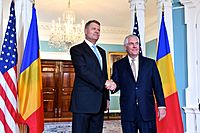
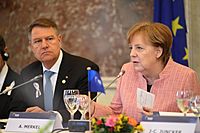


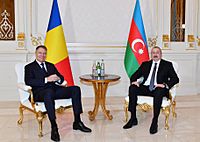

Iohannis became president on 21 December 2014. His campaign focused on fighting corruption and improving the justice system. He also supported a strong pro-Western foreign policy. When he became president, he stopped being a formal member of the National Liberal Party. This is because the Romanian constitution does not allow the president to be a member of a political party while in office.
Working with Parliament and Prime Ministers
Iohannis often held meetings with political parties in Parliament. These meetings focused on important topics like defense spending and election laws. He also discussed how to handle requests to remove legal protection for members of Parliament.
His relationship with Prime Minister Victor Ponta started well but later faced challenges. Iohannis also criticized Parliament for not always supporting requests to investigate politicians. He strongly supported fighting corruption.
International Relations
In foreign policy, Iohannis and the President of Poland, Andrzej Duda, created the Bucharest Nine group in 2015. This group includes nine countries in Eastern Europe. It was formed because of concerns about Russia's actions in Ukraine. The member countries are Bulgaria, Czech Republic, Estonia, Hungary, Latvia, Lithuania, Poland, Romania, and Slovakia.
Political Changes and Resignation
Iohannis faced political challenges during his second term. In 2021, there were changes in the government. A new coalition, the National Coalition for Romania, was formed. Iohannis supported this new government.
In June 2023, the Prime Minister, Nicolae Ciucă, resigned. President Iohannis then chose Marcel Ciolacu to be the next prime minister. Iohannis praised this change, calling it a "new level of seriousness" in Romanian politics.
On 12 March 2024, Iohannis announced he was running for the position of Secretary-General of NATO. He wanted to bring a "renewal of perspective" to the alliance. He withdrew his candidacy on 20 June 2024.
The 2024 Romanian presidential election was canceled in December. The Constitutional Court allowed Iohannis to stay as president until a new election could be held. However, on 10 February 2025, Iohannis announced his resignation. He said he did not want to "create a divided Romania." His resignation became official on 12 February 2025. Ilie Bolojan, the Senate president, became acting president until a new election.
International Presidential Trips
Political Views
Unification of Moldova and Romania
Iohannis has spoken about the idea of unifying Moldova and Romania. During his 2014 presidential campaign, he said that if Moldovan citizens wanted to unite with Romania, no one could stop them. After becoming president, he said Romania should help Moldova become more pro-European. He believes unification could be discussed when both countries are stable.
Székely Autonomy
In 2017, some members of the Hungarian Székely community in Transylvania asked for more self-rule for their region. Iohannis visited the area and said that creating regions based on ethnic groups was not a good idea. He stressed that Romanians and Hungarians should work together.
In April 2020, a bill about Székely autonomy was discussed in Parliament. Iohannis criticized this bill. He was fined by the National Council for Combating Discrimination for some of his comments during this time.
Romanian Minority Rights in Ukraine
Iohannis criticized Ukraine's 2017 education law. This law made Ukrainian the only language for teaching in state schools. Iohannis said this law would limit the education of minorities, including Romanians in Ukraine, in their native language. He canceled a visit to Kyiv because of this issue.
Fighting Corruption
Iohannis strongly supports the fight against corruption in Romania. Since 2014, he has often supported prosecutors who investigate corruption cases. He believes that no one is above the law. He also refused demands to remove the head of Romania's National Anticorruption Directorate.
LGBT Rights
Iohannis has spoken about LGBT rights. He has said that Romanian society is not fully ready for a clear answer on some issues. However, he believes that all minorities have rights. He also stated that "nobody should be persecuted because they belong to a different group or they are different." He has called for tolerance and openness.
Migration
Iohannis has said that migration needs to be managed. He believes it can affect Romanian traditions. He has supported stronger borders for Europe. He accepted the number of migrants his country should take, as set by the European Union. However, he said he was against mandatory quotas.
Personal Life
Klaus Iohannis speaks German, Romanian, and English. He can also speak some French. His original German family name is Johannis. However, it was written as Iohannis on his birth certificate. He has used both spellings.
In 1989, he married Carmen Lăzurcă. She is an English teacher in Sibiu. They do not have children.
Iohannis is a member of the Evangelical Church of the Augsburg Confession in Romania. This is a German-speaking Lutheran church.
His family settled in Transylvania about 850 years ago. They came from the small town of Cisnădie in Sibiu County.
Honours
International and National Awards
- 2023 –
 German Civic Award
German Civic Award - 2023 –
 Franz Werfel Award for Human Rights
Franz Werfel Award for Human Rights - 2020 –
 European Charles IV Prize
European Charles IV Prize - 2020/2021 –
 Charlemagne Prize
Charlemagne Prize - 2020 –
 The Kaiser Otto Prize
The Kaiser Otto Prize - 2020 –
 European Prize Coudenhove-Kalergi
European Prize Coudenhove-Kalergi - 2019 –
 Medal of Honour (Goldene Ehrennadel)
Medal of Honour (Goldene Ehrennadel) - 2018 –
 Franz Josef Strauss award
Franz Josef Strauss award - 2017 –
 Light Unto the Nations award
Light Unto the Nations award - 2017 –
 Semper Opera Ball Dresden Medal of St. George
Semper Opera Ball Dresden Medal of St. George - 2016 –
 Hermann Ehlers award
Hermann Ehlers award - 2016 –
 Martin Buber-Plaque
Martin Buber-Plaque - 2010 –
 Friend of the Jewish Communities in Romania Medal of Honour
Friend of the Jewish Communities in Romania Medal of Honour - 2010 –
 The German Expatriates Association Plaque of Honour
The German Expatriates Association Plaque of Honour
State Honorary Distinctions
- 2023 –
 Grand Collar of the Order of Liberty
Grand Collar of the Order of Liberty - 2022 –
 Grand Cross of the Order for Merits to Lithuania
Grand Cross of the Order for Merits to Lithuania - 2022 –
 Order of the Three Stars – Commander Grand Cross (1st class)
Order of the Three Stars – Commander Grand Cross (1st class) - 2022 –
 Grand Collar of the State of Palestine
Grand Collar of the State of Palestine - 2021 –
 Collar of the Order of the Cross of Terra Mariana
Collar of the Order of the Cross of Terra Mariana - 2019 –
 Emblem of Honour of Romanian Army
Emblem of Honour of Romanian Army - 2017 –
 Grand Order of King Tomislav with Sash and Grand Star
Grand Order of King Tomislav with Sash and Grand Star - 2016 –
 Order (First Class) of the White Double Cross
Order (First Class) of the White Double Cross - 2016 –
 Grand Cross of the Legion of Honour
Grand Cross of the Legion of Honour - 2016 –
 Order of the White Eagle
Order of the White Eagle - 2016 –
 Grand Cross (Special Class) of the Order of Merit
Grand Cross (Special Class) of the Order of Merit - 2016 –
 Order Stara Planina with Ribbon
Order Stara Planina with Ribbon - 2016 –
 Knight Grand Cross of the Order of Merit
Knight Grand Cross of the Order of Merit - 2016 –
 Order of the Gold Lion of the House of Nassau
Order of the Gold Lion of the House of Nassau - 2016 –
 Collar (First Class) of the Order of Vytautas the Great
Collar (First Class) of the Order of Vytautas the Great - 2016 – Order of the Holy Sepulchre of the Patriarchate of the Holy City of Jerusalem and all Palestine and Israel
- 2016 –
 Order of the Republic of Moldova
Order of the Republic of Moldova - 2015 –
 Grand Collar of the Order of the Infante D. Henrique
Grand Collar of the Order of the Infante D. Henrique - 2014 –
 Officer's Cross of the Order of Merit
Officer's Cross of the Order of Merit - 2011 –
 Knight of the National Order for Merit
Knight of the National Order for Merit - 2009 –
 Officer of the Order of the Crown
Officer of the Order of the Crown - 2009 –
 Grand Cross Order of Merit
Grand Cross Order of Merit - 2009 –
 Officer of the Order of Merit
Officer of the Order of Merit - 2008 –
 Commander of the Order of the Star of Italian Solidarity
Commander of the Order of the Star of Italian Solidarity - 2007 –
 Knight of the National Order of the Star of Romania
Knight of the National Order of the Star of Romania - 2006 –
 Cross of the Order of Merit
Cross of the Order of Merit
Books Written by Klaus Iohannis
Klaus Iohannis has written three books about politics:
- 2014 – Step by step (Pas cu pas). This book is about his political journey as mayor of Sibiu. It was a bestseller.
- 2015 – First step (Primul pas). This book continues from "Step by step" and talks about his plans as president.
- 2019 – EU.RO – an open dialog on Europe (EU.RO – un dialog deschis despre Europa). This book is an introduction to the European Union.
Electoral History
Local Elections (Mayor of Sibiu)
| Election | Affiliation | First round | Second round | ||||
|---|---|---|---|---|---|---|---|
| Votes | Percentage | Position | Votes | Percentage | Position | ||
| 2000 | FDGR/DFDR | 20,629 |
33.10%
|
1st | 46,286 |
69.18%
|
1st |
| 2004 | FDGR/DFDR | 73,621 |
88.69%
|
1st | |||
| 2008 | FDGR/DFDR | 50,107 |
83.26%
|
1st | |||
| 2012 | FDGR/DFDR | 53,281 |
77.89%
|
1st | |||
Presidential Elections
| Election | Affiliation | First round | Second round | ||||
|---|---|---|---|---|---|---|---|
| Votes | Percentage | Position | Votes | Percentage | Position | ||
| 2014 | ACL (also supported by FDGR/DFDR) |
2,881,406 |
30.37%
|
2nd | 6,288,769 |
54.43%
|
1st |
| 2019 | PNL (also supported by FDGR/DFDR) |
3,485,292 |
37.82%
|
1st | 6,509,135 |
66.09%
|
1st |
Images for kids
See also
 In Spanish: Klaus Iohannis para niños
In Spanish: Klaus Iohannis para niños
 | Valerie Thomas |
 | Frederick McKinley Jones |
 | George Edward Alcorn Jr. |
 | Thomas Mensah |


